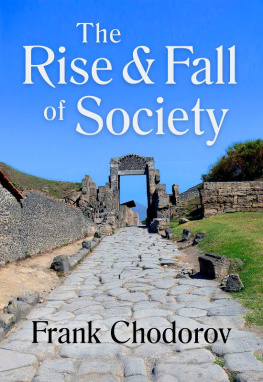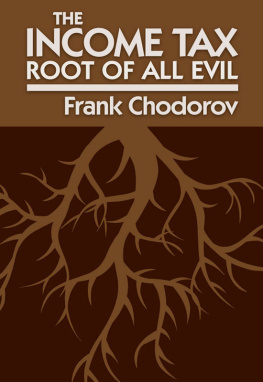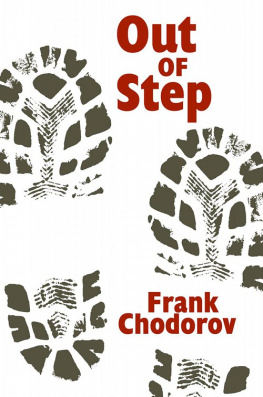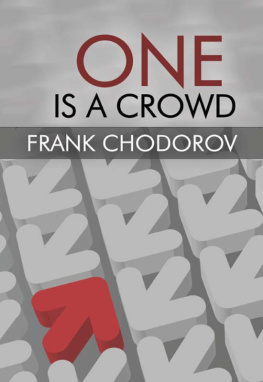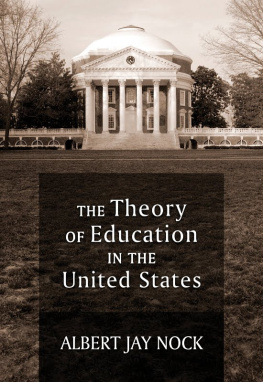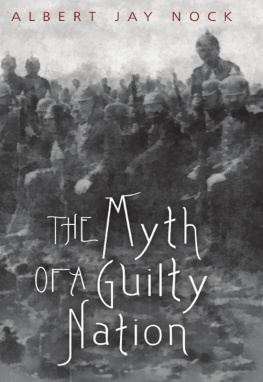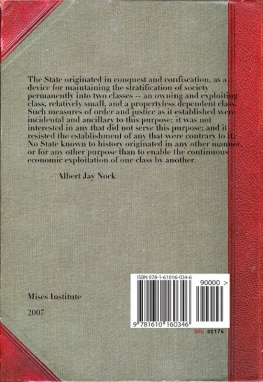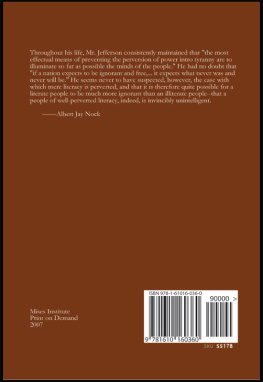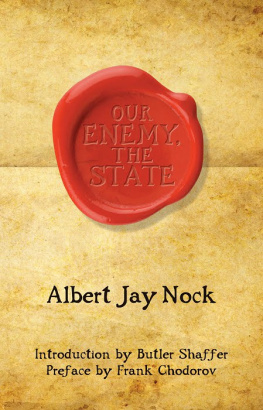
The Rise and Fall
of Society
Also by Frank Chodorov:
THE INCOME TAX: Root of All Evil
ONE IS A CROWD: Reflections of an Individualist
The Rise and
Fall of Society
An Essay on the Economic Forces
That Underlie Social Institutions
FRANK CHODOROV
THE DEVIN-ADAIR COMPANY
NEW YORK, 1959

Copyright 1959 by Frank Chodorov. All rights reserved. No portion of this book may be reproduced in any form without written permission from the publisher, The Devin-Adair Company, New York 10, except by a reviewer, who may quote brief passages in connection with a review.
Canadian agents: Thomas Nelson & Sons, Ltd., Toronto
Library of Congress Catalog Card No. 59-8205
Manufactured in the United States of America
To Francine
When you are old enough to read this book there will be a Society and there will be a State, and both will take their character from the reigning ideas of the times. I suspect that these ideas, planted in the American mind before you were born, will be so different from those expressed in this book that you may have some difficulty in understanding how your grandfather got that way. That could provide you with some good, clean funtrying to reconstruct a long-lost pattern of thought.
Foreword
IT IS HARD to think of an age which, with less reason, has been more smugly self-satisfied than ours. The orthodoxies of the most solidly established high religious ages, founded as they were upon a belief in the transcendent sources of truth, have always been safeguarded by their very belief in the transcendent from the idolatry of mans worship of himself and his established habits. The power of kings and the pride of prelates remained intrinsically limited by the common acceptance of truths to which all men were subject. So when abuses proliferated and prophets arose to condemn the growth of power and the distortion of dogma, though their way was hard, they could appeal to fundamental beliefs to which everyone adhered.
But in our society, where relativism rules supreme, where truth is not merely distorted but its very existence denied, power grows to monstrous proportions without any inner check in the bosoms of those who hold it. In place of truth, the ideal is adjustment, that is, the acceptance of whatever happen to be the modes of thought and action established among usnot because it is purported that they are true, but just because they are. In this paradise for power unchecked by any criterion but its own, the way of the man who would bear witness to and fight for truth because it is truth is doubly hard. Not only, as in former ages, must he confront the established authorities of the day with the divergence of their acts from the demands of truth; he has to substantiateexplicitly or implicitlythe very title of truth as criterion.
This is the road Frank Chodorov has chosen. As essayist and as editor, on the lecture platform and in his personal influence upon those around him, he has devoted himself to a single end: to bear witness against that worship of the collective which is the omnipresent political error of the 20th century, and to vindicate the primary value of the individual person as the foundation from which all political thought and action derives its meaning.
His firm defense of the value of the individual person is in turn based upon his insistence on the validity of objective truth, of the Natural Law as source and criterion of right and wrong in the relations among men. This, in the atmosphere of the day, is adding insult to injury. Not content with attacking the dominant contemporary assumption that the collective people, as represented by the state, is the moral center of human existence, infinitely superior to any mere individual person, he strikes at the same time at the positivism and the pragmatism that have made it possible for this assumption to take root and grow.
Frank Chodorov has devoted the whole of his mature life to a struggle against the twin perversions of concentrated power in the state and intellectual irresponsibility in the academy. As editor of The Freeman, Analysis, and Human Events, in his multifarious writings and speeches, in his booksOne Is a Crowd and The Income Tax: Root of All
Evilhe has never ceased to hammer away at his essential theme: the danger of concentrated power to the freedom of individual human beings. One does not have to agree with him on every aspect of his analysis, or with all his proposals, to recognize that his voice is one of the few clear voices of freedom speaking today. He has truly something of the prophet about himnot the hortatory prophet, but the quiet speaker of parables.
Now in his seventies, he gives us in this book a vigorous and compelling epitome of his beliefs. The sentence with which it ends, The will for freedom comes before freedom, reflects his purpose and underlines his achievement. For to the re-awakening of the will to freedom and the understanding of freedom, Frank Chodorov has contributed mightily.
FRANK S. MEYER
Acknowledgment
THIS ESSAY is the result of conversations with Albert Jay Nock, author of Our Enemy the State, some fifteen years ago. His book was then out of print and the publishers were considering a reissue; for commercial reasons they held that it should be expanded. I had been suggesting to him the need of revision and expansion for quite another reason. The book was based on a series of lectures delivered to a graduate class in history, and on that account it dealt with the State historically; my argument was that it could be handled as an economic phenomenon and that the inclusion of this phase would broaden the scope of the book. Something of a joint venture along this line was under consideration at the time of Nocks death.
I mention this fact to ward off the charge of plagiarism. For, as any reader of Our Enemy the State will readily recognize, I have borrowed ideas from it quite liberally in the writing of this essay. I plead the circumstance related above as my justification. Knowing Nock, I am sure that he would be the last to take me to task for appropriating some of his argument, and would be quick to point out that originality is a fiction and a posture.
The fact is, I am under obligation to many writers of economics and political science; traces of a half century of reading have found their way into this book. Why, then, did I not acknowledge my debt to these writers in a formal way, with annotations and a bibliography? Partly because this would have entailed a lot of drudgery, with nothing more to show for it than a few extra pages of print, and partly because this method of drawing upon authorities for sup-port has always struck me as special pleading, spurious and slightly dishonest.
When an author refers the reader to a previous author, in an annotation, he is really saying: This is not my idea, it is what an established authority has said on the subject and ought therefore to be accepted without question. But, as every exponent of a theory knows, one can draw upon authorities to support either side of a case, just as lawyers do with precedents, and it is natural for a protagonist to cite only those authorities who support his thesis; if he cites a contrary-minded authority, it is only to set him up for demolition. Only a gullible reader, or one who was convinced before he took up the book, will be impressed by this shoring up of argument.
Next page
